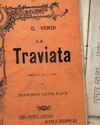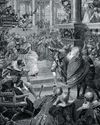
Handel's Messiah has been recorded more often than any other major choral work. If we want to listen at home today, the choice is breath-taking. But winding the clock back, things were a little different at the beginning of the last century. Although fledgling record companies seized on Messiah as a money spinner, they were only able to offer a few short extracts. The earliest records and cylinders ran for just a couple of minutes, so Handel's music was mercilessly chopped to fit.
Although radical, this surgery was surprisingly successful. Because Handel's style was fairly repetitive, many of his simpler airs and choruses actually slimmed down quite easily. In any case, most listeners already knew the music well, especially the 'Hallelujah' chorus whose march-like style was especially popular with brass bands who recorded it regularly - adding a bit of class to the catalogues of even the humblest record companies.
The first attempt to record a sizeable chunk of Messiah was made by the wonderfully named Gramophone and Typewriter company (G&T) during the summer of 1906. Their 1907 catalogue must have created quite a stir, offering customers an unprecedented 25 movements spread over twelve 10-inch and thirteen longer playing 12-inch records: all single sided - the idea of recording on both sides of the record had yet to catch on. This amounted to nearly an hour- and-a-half's music - a rare achievement. And an expensive one. Customers could buy the records singly or at a special combined price of £5 15s 6d. Compared with average annual earnings of around £70, it's clear that this was a prestige product aimed at the high end of the market.
この記事は BBC Music Magazine の December 2023 版に掲載されています。
7 日間の Magzter GOLD 無料トライアルを開始して、何千もの厳選されたプレミアム ストーリー、9,000 以上の雑誌や新聞にアクセスしてください。
すでに購読者です ? サインイン
この記事は BBC Music Magazine の December 2023 版に掲載されています。
7 日間の Magzter GOLD 無料トライアルを開始して、何千もの厳選されたプレミアム ストーリー、9,000 以上の雑誌や新聞にアクセスしてください。
すでに購読者です? サインイン

A way with words
Great operas are inextricably linked with their composer but, asks Jessica Duchen, how often do we acknowledge the important role of the librettist?

THE MAGNIFICENT SEVEN Pick a theme... and name your seven favourite examples
Conductor Domingo Hindoyan nominates the best musical depictions of anger and frustration
A glittering beacon
Until its destruction in the fire of 1936, the Crystal Palace was one of the world's most exciting music venues, and its legacy still lives on today, writes Tom Service.

Christoph Willibald Gluck
Paul Riley traces the wandering existence of a cosmopolitan composer who made it his life's work and ambition to rip up opera's rulebook

The Awards are upon us once more!
Time to vote for the best recordings of the last 12 months

LEADING FROM THE FRONT
From running efficient rehearsals to learning to speak to orchestras with clarity and empathy, an array of exciting courses for conductors has bloomed in recent years, finds Clare Stevens

Kindred spirits
As their second opera takes to the stage, composer Gregory Spears and librettist Tracy K Smith talk to Charlotte Smith about their special partnership

The censors' refusal to play ball drives Verdi to despair
In the early months of 1857, Verdi had Shakespeare on his mind, and specifically King Lear.

11 Bed-Hopping Composers
Jeremy Pound lifts the covers off those notorious notesmiths who found the thrill of playing away simply too hard to resist

André Rieu Violinist, Conductor
King of the Waltz, Dutch musical impresario André Rieu has taken the world by storm with his Johann Strauss Orchestra.